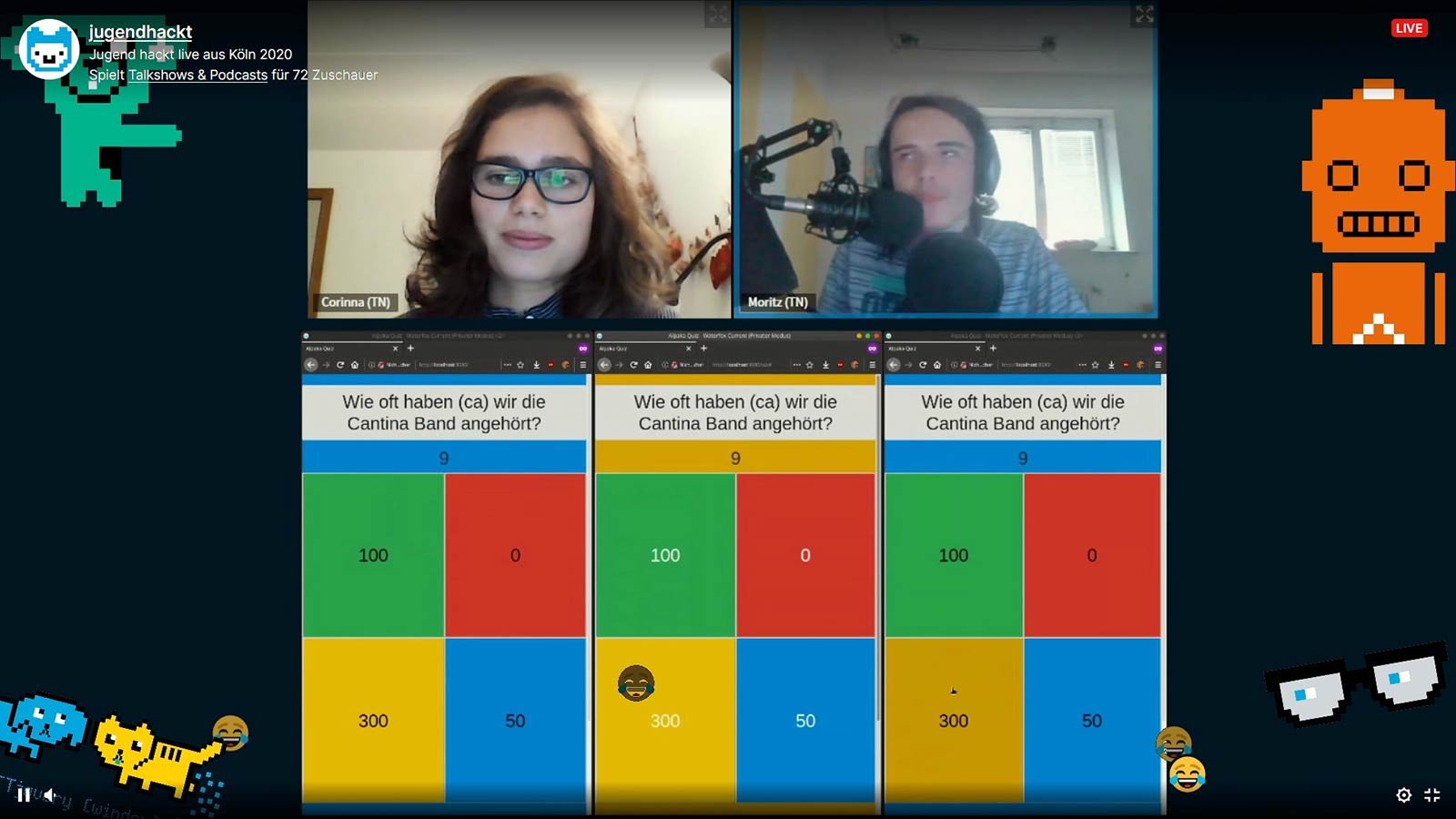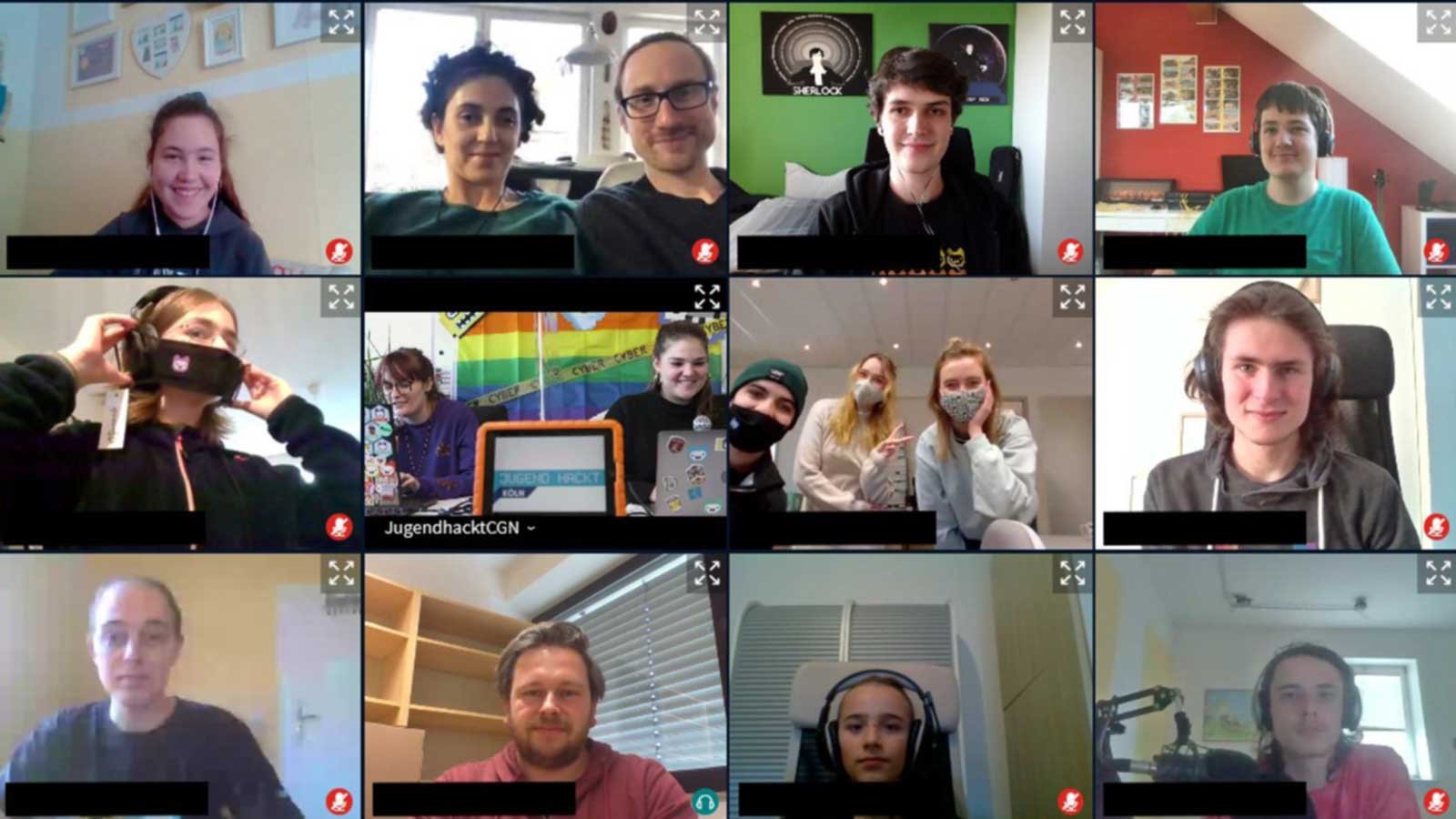Many events had to be postponed or even canceled completely this year. Not so at Jugend hackt in Cologne from November 27 to 29..
The Jugendhackathon in Cologne was implemented completely digitally for the first time. adesso insurance solutions was happy to support the event again. Around 25 young people, 11 mentors, and the 10-person organizing team spent four days using code to improve the world. This resulted in five projects.
Digital implementation
It goes without saying that data protection and the open-source concept were very important for digital implementation. Thus, only tools that met these criteria were selected. The online conference room structure, for example, was implemented with the help of BigBlueButton. During the coding breaks, an entertainment room and a break room were available for the participants. Here, free online multiplayer games were played, people talked and ate together, promoting exchange and a sense of community despite the distance. In between, playful activities also provided variety. Thus, the hacker ethics — based on the well-known TV show “1, 2 or 3”— was also implemented digitally. After each question, there was a discussion of the answers. Here is a sample question:
“The government is having an AI programmed to decide who should and should not receive the corona vaccine. It will take into account not only age and health, but also occupation and education level. What do you think about this?”
The young people asked themselves whether an AI can really be objective. This resulted in a very multi-layered discussion, in which they demonstrated how deeply they can already think about these complex ethical-social issues.
“But aren't people more influenced than a machine?”
“A machine is only as good as the people who developed it!”
Of course, there were also input talks where participants could expand their knowledge. Wolfram Eberius gave an introduction to Open Data and Julia Barthel reported on the topic of diversity, especially with regard to women in IT.
“Role models are so important so that future programmers feel empowered to enter the IT industry.”
Alpaca Post!
In order to provide a little event feeling at home, everyone received a care package that included mate, snacks, and stickers as well as small gifts from adesso insurance solutions. For example, the young people and mentors could enjoy a backpack made of eco-friendly material, a camera cover and an induction charger. The atmosphere during the event was very similar to the analog version. People joked together, worked productively, learned a lot, and exchanged ideas.
“Today we got to know a new mate and a new programming language — in other words, everything you'd hope for from a hackathon.”
The project results
On Sunday afternoon, the project results were presented to the audience as a livestream. The presentation can be viewed here afterwards. Once again, the projects of the young hackers were very creative and imaginative.
For example, the team of the project “Alpaka-Quiz” developed a privacy-compliant question and answer tool. While traditional quiz tools don't place much emphasis on open source, the Alpaca Interactive Quiz does, while still providing all the traditional features required for a quiz.

Project presentation Alpaca Quiz: Participants Corinna and Moritz (top) present their project (bottom). There are four possible answers to the quiz question “How many times (approximately) have we listened to the Cantina Band?”: 100, 0, 300, and 50. The answer choices have different colors.
Homeschooling is made difficult for many students by the fact that their schools use vast amounts of different tools and platforms. This lack of clarity means that important things can be overlooked. The “Alpaka Dash” project addresses this issue: the platform bundles all messages, assignments, and deadlines.
The free multiplayer Among Us is similar to the popular analog game Werewolf. Currently, it is very popular and was also used at the Jugend hackt weekend! The game inspired the group “InfectWorld” to their own game idea: the serious game simulates the course of Corona. At the beginning of the round, there is an infected person in the group whose identity needs to be uncovered. This person infects other players, who can protect themselves from infection with the help of various measures, such as a mouth guard or the minimum distance.
Boredom is not an option with the project “AlpakaTorum”! Indeed, the group has developed a platform that provides information about a wide variety of hobbies. There are so many leisure activities that, in addition to classic sports, we often forget how versatile hobbies can be. Especially in times of contact restrictions, this is a great way to find alternatives to relieve boredom.

JJHCGN20 group photo: A group photo of all Cologne participants, mentors, and organizing team members. Unfortunately, not together on-site, but with webcam and headset in front of their computers. The names are blacked out for data protection reasons.
2020 has shown us that false reports can quickly make the rounds on a wide variety of platforms such as Twitter and Facebook. To ensure that fake news is uncovered more quickly in the future, the "Alpaka News" group has developed a website where, for example, tweets with false content can be reported and debunked by credible sources. The website is divided into different sections such as politics, science, culture, sports, business, and beauty.
In these five projects, the young hackers were able to implement their ideas and improve their programming skills. The enthusiasm of all participants and the results show us once again how valuable Jugend hackt is. As a supporter, we are proud to be part of it.

